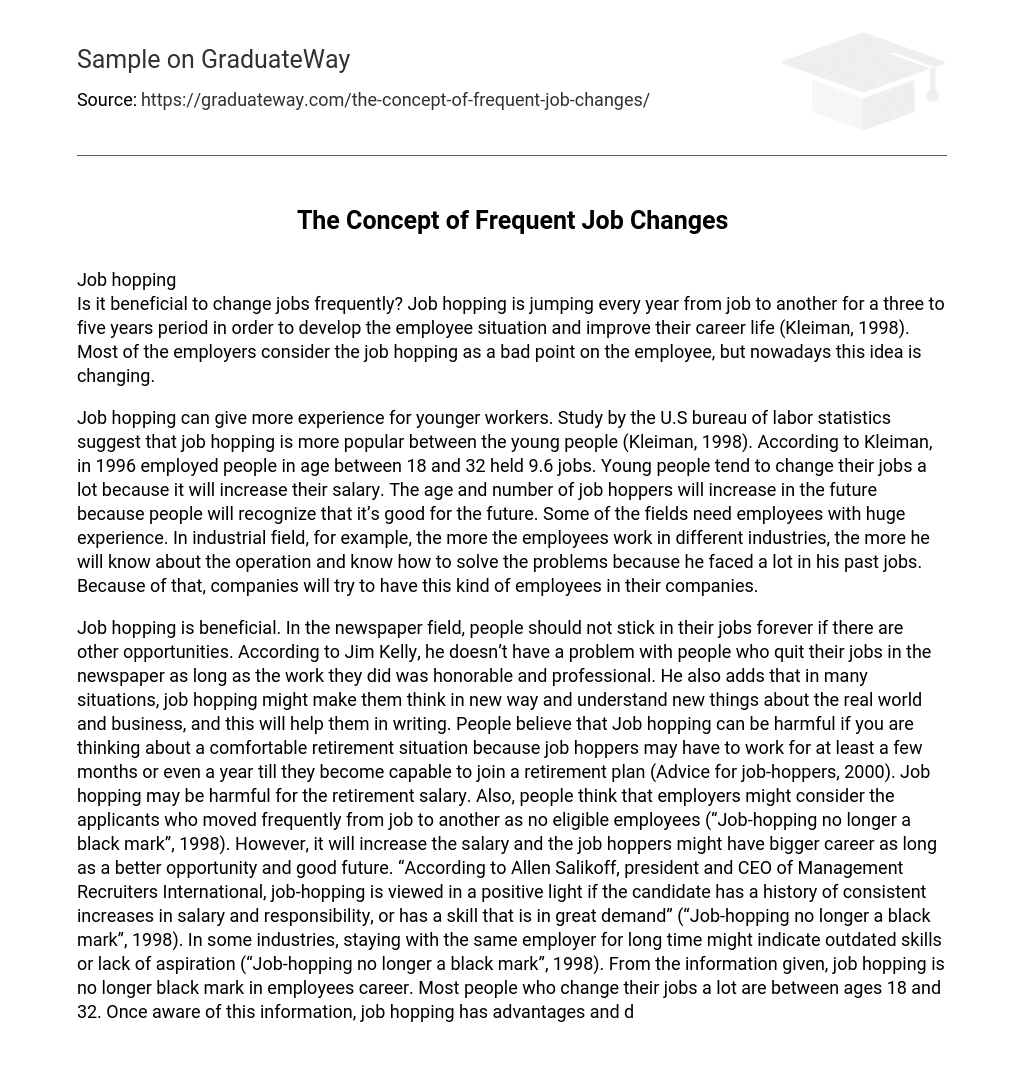Job hopping
Is it beneficial to change jobs frequently? Job hopping is jumping every year from job to another for a three to five years period in order to develop the employee situation and improve their career life (Kleiman, 1998). Most of the employers consider the job hopping as a bad point on the employee, but nowadays this idea is changing.
Job hopping can give more experience for younger workers. Study by the U.S bureau of labor statistics suggest that job hopping is more popular between the young people (Kleiman, 1998). According to Kleiman, in 1996 employed people in age between 18 and 32 held 9.6 jobs. Young people tend to change their jobs a lot because it will increase their salary. The age and number of job hoppers will increase in the future because people will recognize that it’s good for the future. Some of the fields need employees with huge experience. In industrial field, for example, the more the employees work in different industries, the more he will know about the operation and know how to solve the problems because he faced a lot in his past jobs. Because of that, companies will try to have this kind of employees in their companies.
Job hopping is beneficial. In the newspaper field, people should not stick in their jobs forever if there are other opportunities. According to Jim Kelly, he doesn’t have a problem with people who quit their jobs in the newspaper as long as the work they did was honorable and professional. He also adds that in many situations, job hopping might make them think in new way and understand new things about the real world and business, and this will help them in writing. People believe that Job hopping can be harmful if you are thinking about a comfortable retirement situation because job hoppers may have to work for at least a few months or even a year till they become capable to join a retirement plan (Advice for job-hoppers, 2000). Job hopping may be harmful for the retirement salary. Also, people think that employers might consider the applicants who moved frequently from job to another as no eligible employees (“Job-hopping no longer a black mark”, 1998). However, it will increase the salary and the job hoppers might have bigger career as long as a better opportunity and good future. “According to Allen Salikoff, president and CEO of Management Recruiters International, job-hopping is viewed in a positive light if the candidate has a history of consistent increases in salary and responsibility, or has a skill that is in great demand” (“Job-hopping no longer a black mark”, 1998). In some industries, staying with the same employer for long time might indicate outdated skills or lack of aspiration (“Job-hopping no longer a black mark”, 1998). From the information given, job hopping is no longer black mark in employees career. Most people who change their jobs a lot are between ages 18 and 32. Once aware of this information, job hopping has advantages and disadvantages. However, people should think more about job hopping now a days because it might build a good career.
Bibliography:
Advice for job-hoppers. (2000). USA Today, 128(1659), 1.
Job-hopping no longer a black mark. (1998). Office Systems, 15(11), 2. kelly, J. (2004). Experience is good, but beware job hopping. The Quill, 92(2), 8-10. Kleiman, C. (1998). Job hopping has ups, downs for workers and employers. Austin American Statesman.





